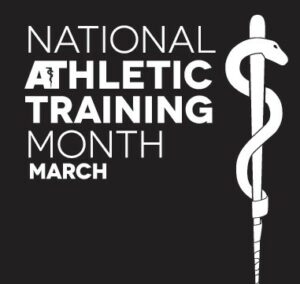WHAT DO ATHLETIC TRAINERS DO? AND WHY?
Have you ever see guy/girl running on the field during a sporting event when an athlete suffers an injury? Guess what?!? I am that guy in the Deer Park School District. You may see me wearing a Fanny-Pack (contains all my first aid supplies, assessment tools, and treatment devices, some would refer to it as a utility belt) that bounces round on my hip, hustling towards somebody in pain trying to help and assess the athlete within seconds. I am an trained to be a first-responder and recognize the signs and symptoms of specific injuries. Helping athletes off the field without further injuring themselves, usually using my body or my hands as a splint is a large part of my job . You may be wondering when I would use my hands as splint? Well, a good example of this is when I support an unstable cervical spine(neck) following some sort of hit and my hands have to prevent the neck from moving so further damage doesn’t occur.
SIDELINE CHEERLEADER AS WELL?
Even though my job on the field is to assess and treat acute injuries, I also give the athletes some moral support as well, so more commonly, I use my hands to high-five everybody on the sideline. It’s a good day when I can walk away breathing easy from an event, and not stressed about an athlete who has to spend the night in the hospital (but if they do, i always call, check up, visit and keep in constant contact with the parents
DEFINITION OF AN ATHLETIC TRAINER AS PER NATA
By definition from the National Athletic Trainers association an “Athletic trainer (ATs) are highly qualified, multi-skilled health care professionals who collaborate with physicians to provide preventative services, emergency care, clinical diagnosis, therapeutic intervention and rehabilitation of injuries and medical conditions. Athletic trainers work under the direction of a physician as prescribed by state licensing statutes. The NATA Code of Ethics states the principles of ethical behavior that should be followed in the practice of athletic training. Athletic training is recognized by the American Medical Association (AMA), Health Resources Services Administration (HRSA) and the Department of Health and Human Services (HHS) as an allied health care profession.”
BEING AN ATHLETIC TRAINER CAN BE FRUSTRATING BUT REWARDING
It is sometimes frustrating to explain what I do as a profession, but my quick answer is ‘I help people feel better.I don’t worry about the way I look in my khakis and utility belt or that the athlete didn’t say thank-you after a treatment session (although you should). I don’t care that I don’t write/use grammar well(no one should be checking, besides Jessica). I can handle a parent screaming at me (more often then not) because I am taking their child out of the game, or that a coach tells me I am making a big mistake(its never a mistake to put a child’s well-being first) because I know that in the end I am making the BEST decision for my athletes!! What I care about is the health and safety of all my athletes. To me that is what an Athletic Trainer is and that is what I do, I genuinely care.
–Sincerely, Danny ATC
Happy National Athletic Training Month!


